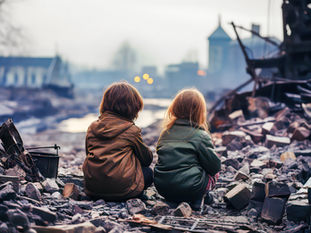

Climate Change & The Uninhabitable Earth
Dec 30, 2024
3 min read
2
5
0
What Is The Uninhabitable Earth?
The Uninhabitable Earth by David Wallace-Wells offers a sobering exploration of the near-future impacts of climate change, rooted in the stark reality that global warming is already reshaping the planet faster than previously imagined. Through an array of scientific studies and real-world examples, Wallace-Wells paints a vivid picture of a potentially dire future—complete with extreme weather events, collapsing ecosystems, and the social upheaval they cause. He emphasizes that these scenarios aren’t just distant possibilities, but unfolding realities that will increasingly challenge our political systems, economies, and daily lives.
In weaving together warnings from climate science with insights into human psychology and policy inertia, Wallace-Wells underscores humanity’s responsibility in both causing the crisis and possessing the tools to mitigate it. He doesn’t offer easy solutions but rather calls for a radical transformation in how we think about consumption, global cooperation, and environmental stewardship. Ultimately, The Uninhabitable Earth is not just a cautionary tale but a rallying cry, urging readers to confront an uncomfortable truth and act before the most catastrophic consequences become unavoidable.
What We Can Learn From A Book On Climate Change

Climate Change Related Disasters Are Accelerating
Wallace-Wells highlights how extreme weather events—such as hurricanes, wildfires, and heat waves—are becoming more frequent and intense. For instance, the book cites hurricanes like Harvey and Maria, which caused massive flooding and destruction in the Gulf Coast and Puerto Rico, underscoring the economic and human toll of escalating climate impacts.
Economic Strain and Political Unrest
The author points to how climate change can destabilize societies by straining agriculture, infrastructure, and healthcare systems. As an example, regions suffering from prolonged drought may see failing crop yields and mass migration, fueling conflicts over resources and placing unprecedented pressure on political institutions to manage crises.
Human Agency and Responsibility
Despite painting a bleak picture, Wallace-Wells stresses that our actions—through policy reforms, technological innovation, and shifts in consumption—can still reshape the trajectory of climate change. He highlights success stories like the rapid growth of renewable energy in certain European countries as evidence that concerted effort and government support can help decelerate the worst effects of global warming.
What Others Are Saying
"A wake-up call for anyone concerned about the future of our planet."
-Amazon Reviewer
"While important, the book sometimes feels overly pessimistic."
-Amazon Reviewer
On Amazon, The Uninhabitable Earth has received praise for its urgent tone, thorough research, and accessible writing style, with many readers calling it a wake-up call for those unaware of the severity and immediacy of climate change. They appreciate David Wallace-Wells’s ability to synthesize complex science and real-world events into a compelling narrative. However, some reviewers criticize the book for what they perceive as alarmism, arguing that Wallace-Wells focuses too heavily on worst-case scenarios without offering enough concrete solutions or balancing the discussion with more optimistic viewpoints. Critics also point out that the book can be overwhelming for readers who are new to climate change literature, although supporters counter that its stark honesty is precisely what’s needed to prompt meaningful action.
Project Democracy's Review

From the vantage point of Project Democracy, The Uninhabitable Earth serves as a stark warning about the fragility of democratic institutions under the weight of climate change. David Wallace-Wells presents a compelling—if unsettling—argument that the intensifying effects of global warming, from extreme weather to mass migration, place unprecedented strain on governments’ ability to respond swiftly and equitably. In doing so, he reveals how climate disruptions can erode public trust, exacerbate inequality, and ignite political instability—conditions that challenge the very foundation of democratic governance.
Yet the book also underscores the power of civic engagement and collective action. By outlining the dire consequences of inaction, Wallace-Wells effectively rallies citizens to hold leaders accountable and advocate for robust, future-facing policies. For Project Democracy, this message is both sobering and galvanizing: a call to ensure democratic frameworks remain strong and inclusive so that society can chart a sustainable path forward. Only through transparent decision-making, participatory policymaking, and social responsibility can democracies weather the global storm that climate change brings.
Want to pick up a copy or download The Uninhabitable Earth?
Buy on Amazon today!

Want to read other books like The Uninhabitable Earth?
Follow Project Democracy on GoodReads.
Did you read The Uninhabitable Earth?
If so let us know what you thought and leave your comments below.







